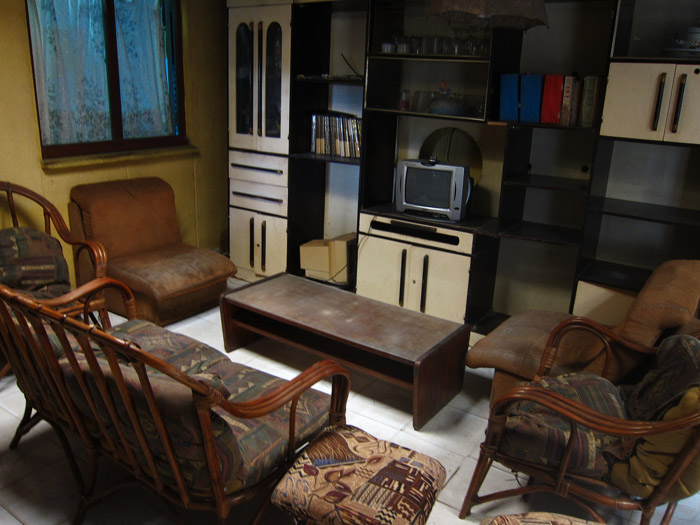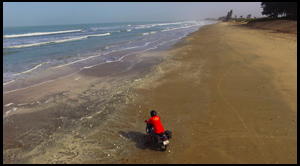The following is part 2 of a piece on Toits Rouges, a neighborhood in the Yopougon quartier of Abidjan. I have spent a lot of time in this neighborhood over the past several years. I hope this offers an accurate picture of that place. Click here to read part 1.
Both doors to Mr. Konate’s house lock from the inside, but not the outside. In other words, the house can only be locked when there’s someone in it.
The first door opens into a walled rectangular area of chipped concrete and dirt. A banana tree leans against the far wall and a few sagging clotheslines occupy the opposite end. In between, there is a tiled platform with a sink above it, a few orange-headed lizards doing push-ups, and the door to the house itself.
Fatou, the oldest daughter in the half-Malian, half-Ivorian family that lives in the front room of the house, is sitting by the door on a small wooden stool, slicing plantains while humming that Chidinma song and occasionally yelling at her younger brothers, Abou and Ismo.
It is because of Abou and Ismo that the following phrases are heard more often than any others in the Konate house: “Y a QUOI!?” (literally “there is what?,” but in this context you can think of it as “what are you doing you crazy fool?!”), “Il FAUT laisser!!!!” (leave it alone!!), “QUITTE la!!!” (get out of here!!!) and “SAUVAGES!!” (Savages!! – often directed at both boys simultaneously). At 8 and 11-years-old, Ismo and Abou are highly skilled in the following disciplines: unleashing terror and disturbing the peace.
Nico is the mother of Fatou and the two boys. If you find yourself sitting in her proximity (which you will because she will have offered you a chair upon your arrival), it won’t be long before you are digging into a titanic portion of rice and tigadigana or, if you’re lucky, foutou and sauce graine.
Nico is married to Ali, a tall, broad-shouldered Fulani from Mali. He is bald, and he has a moustache that confers great authority. Ali makes a modest income working for a small credit agency, but you would have no way of knowing this if you saw him on Friday afternoon when he strides home from the mosque in a regal boubou of shimmering bazin.
Mr. Konate’s house has four rooms. Ali, Nico and the kids in the first room, Mr. Konate’s daughter in the second, his other daughter and his son in the third, and him in the fourth. The second room was previously occupied by a Dioula (or Jula) man that was always late on rent, but never without a variety of females paying him daily visits.
Mr. Konate allowed him to stay for a time. They shared similar politics and Mr. Konate felt a certain amount of sympathy for his Jula tenant, who had lost his nephew during the post-election crisis of 2010-11 (accused of being a rebel at a Yopougon roadblock manned by Gbagbo partisans, he was dragged from a car and beaten to death).
I am also an occasional resident in the house, having stayed in the third room, an airless shoebox, with Faty (Konate’s oldest daughter), her cousins, her brother, friends of mine passing through Abidjan, and random couchsurfers – not all at once, but sometimes almost.
After Mr. Konate kicked out the Jula man and his girlfriends, Faty made his room smell like a swimming pool and I took up temporary residence in it. My girlfriend was with me at the time and the total occupancy of the house reached 11 persons.
But it didn’t feel like 11 people were living in the house. The living room swelled during champions league matches and nightly screenings of dubbed soap operas, but otherwise life took place outside the house. Under the mango tree between Madou’s kiosk and the garbadrome; in the hair salon or the barbershop; along the broken sidewalk. Nearly every meal was prepared outside and the kitchen itself was rarely used.
But you could (and can) almost always find Mr. Konate in his room. If he’s not there, he is doing one of four things: jogging around the neighborhood in a faded blue and yellow tracksuit that is two sizes too big (he does this every other night), visiting his mother in Sicogi (another neighborhood of Yopougon), watching football in the living room, or going to mosque on Friday.
Mr. Konate is somewhat reclusive, but he is not anti-social. Greet him in Jula and you’ve bought yourself a 10 minute conversation. Bring up Koranic scholarship and you might as well pull up a chair. And if you find yourself in the living room when Mr. Konate is watching an Arsenal match, you will hear a lecture on Gervinho’s tendency to alternate between brilliance and incompetence that may last as long as the match itself.
But for a long time, there was one person that Mr. Konate refused to talk to — his daughter’s boyfriend. Faty’s boyfriend (D) was a Gbagbo partisan, and while he was not manning Yopougon checkpoints and attacking anyone that spoke Jula, he was militant in his own way. Mr. Konate, who is originally from Bouake, the former capital of the Forces Nouvelles, was an outspoken supporter of Alassane Ouattara, Gbagbo’s opponent in the final round of 2010 presidential elections.
D was not welcome in Mr. Konate’s house. They rarely saw each other, but when they did, no words were spoken, no eye contact was made. I remember standing at Mr. Konate’s door with D, waiting for Faty. She walked out with her father at her side. Mr. Konate greeted me, looking past D as if he wasn’t there. For his part, D turned and walked away. For those who have been to Cote d’Ivoire, this scene — two people, standing less than 1 meter apart, refusing to acknowledge each other’s presence — may be unimaginable.
After close to two years of this, Ali intervened. Ali was a Ouattara supporter, but not an outspoken one. He was tired of watching two people whom he respected behave in this way.
Ali was an ideal candidate to facilitate a mediation. Few people in the neighborhood have more integrity (that’s in part because of his friendliness, work ethic, and love for his family, but also because of his moustache).
And so a Malian called upon two Ivorians — one from the south, one from the north — to sit down together in Mr. Konate’s living room. After a 30 minute discussion with Ali at the helm, Mr. Konate and D shook hands and shared a laugh.
No one told me about Ali’s mediation when it happened. I was in Bamako at the time. I would be in Abidjan several weeks later.
When I arrived at Mr. Konate’s house, I took to my usual post-36-hour-bus-ride routine: find the most abrasive piece of woven twine (the West African sponge, effective and less painful than it sounds) and seal myself in the shower for 20 minutes of laborious bathing.
When I opened the bathroom door, D was sprawled out on one of the couches in Mr. Konate’s living room. Mr. Konate was sitting next to him, watching an Olympique de Marseille match and eating peanuts. I was apparently bewildered. D smiled and began to laugh. Mr. Konate turned to me and said “i sigi, na dumini ke.” Sit down, come and eat.
I will post the final part of this story next week.
**NOTE** This post touches on the 2010-11 post-election crisis, but it is not meant to be political in any way. If anything, I hope it offers a clearer picture of Yopougon, which is a more complex neighborhood — politically and otherwise — than many people think.





Another beautiful, marvelous, wonderful post. I love your writing, Phil! Makes me feel like I was there.
Well pal, you have outdone yourself again. You have managed to to make me day exponentially better than it was before I read this post. I wish it never ended. Thanks man….
14 in a row for the Nuglars.
I was just reading through your blog again (at work, wishing I was out in the summer heat). Reading them back to back is lovely.
I do hope you are writing a book. Seriously.
Thanks for the kind words, everyone! Much appreciated